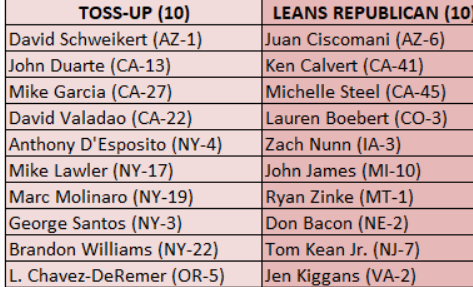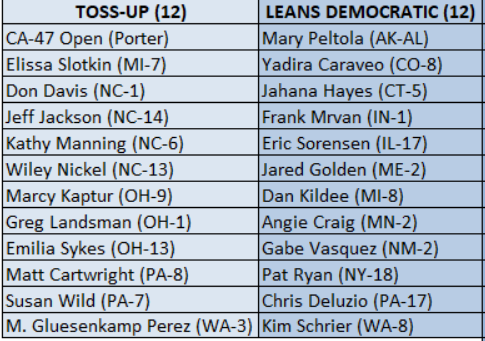By John Isaacs
While the 2022 elections are not far in the rear-view mirror, many incumbents have already launched their 2024 elections. This is especially the case for the House of Representatives where each Member is up for reelection every two years.
This early start is particularly relevant for the most competitive seats. Six candidates endorsed by the Council in 2022 won their races by six or fewer points and will be likely targets for conservatives:
- Angie Craig (D-MN-02)
- Greg Landsman (D-OH-01)
- Mike Levin (D-CA-29)
- Katie Porter (D-CA-47)
- Eric Sorensen (D-IL-17)
- Susan Wild (D-PA-07)
The 2022 elections produced a House with one of the closest margins in history. Republicans won control by a margin of 222-213, meaning every close race will be important. In fact, the 222-seat GOP majority is the smallest number of House seats by the winning side in modern history.
Three major contributing factors to the surprisingly strong Democratic showing in 2022 were the questionable quality of the candidates Republicans put up for election, voters’ reaction to the Supreme Court’s decision to overturn the Roe v. Wade decision and unpopular policies Republicans pushed during the campaign.
Redistricting will also remain an important factor with major implications for the 2024 elections. While most states settled House redistricting after the 2020 Decennial census, a number of states are likely to revisit the district lines this year, particularly Ohio and North Carolina. In both states, the state Supreme Courts limited GOP gerrymanders.
Political expert Ronald Brownstein pointed out, “As many as a dozen or more states could redraw the lines.” Cases challenging congressional gerrymanders as violation of state laws are pending in Florida, Utah and New Mexico.” New York is another state that may reconsider redistricting.
Certainly, another major factor for 2024 is the race for President, whether it is Biden vs. Trump or other party nominees. A strong showing by a presidential candidate in the general election can help other party nominees further down the ballot.
David Wasserman, Senior Editor, US House, at the Cook Political Report, notes that 18 Republicans represent districts carried by President Biden in 2020 and just five Democrats are sitting in districts carried by Donald Trump. This imbalance of potentially vulnerable GOP seats will help keep the House in play for Democrats.”
In some encouraging election news from February 21 special elections, the results in four local elections in Wisconsin, New Hampshire, Virginia and Kentucky all produced solid margins for the Democratic candidates. As the Washington Post’s “The 5-minute Fix” pointed out, “which party is over-performing in such races tends to be a pretty good predictor of which party is ascendant, especially when you have multiple high-profile and/or federal races.”
The Cook Political Report produced a list of the following closest House races as of February 2, 2023:
11 Democratic Toss Up
- CO-08 Caraveo
- NC-01 Davis
- NC-06 Manning
- NC-13 Nickel
- NC-14 Jackson
- NM-02 Vasquez
- OH-01 Landsman
- OH-13 Sykes
- PA-07 Wild
- PA-08 Cartwright
- WA-03 Gluesenkamp Perez
9 Republican Toss Up
- AZ-01 Schweikert
- AZ-06 Ciscomani
- CA-13 Duarte
- NJ-07 Kean Jr.
- NY-04 D’Esposito
- NY-17 Lawler
- NY-19 Molinaro
- NY-22 Williams
- OR-05 Chavez-DeRemer
13 Lean Democratic
- AK-AL Peltola
- CA-47 Open
- CT-05 Hayes
- IL-17 Sorenson
- IN-01 Mrvan
- ME-02 Golden
- MI-07 Slotkin
- NV-03 Lee
- NY-03 Santos
- NY-18 Ryan
- OH-09 Kaptur
- OR-06 Salinas
- PA-17 Deluzio
9 Lean Republican
- CA-22 Valadao
- CA-27 Garcia
- CA-41 Calvert
- CA-45 Steel
- CO-03 Boebert
- IA-03 Nunn
- MI-10 James
- NE-02 Bacon
- VA-02 Kiggans
Larry Sabato’s Crystal Ball lists total of 44 competitive seats — 20 currently held by Republicans and 24 held by Democrats — in the most competitive categories (Toss-up or Leans). That’s just 10% of the total seats in the House.
Competitive Republican Seats (From Sabato’s Crystal Ball)
Competitive Democratic Seats (From Sabato’s Crystal Ball)
Council for a Livable World will continue to focus on candidates and members who, regardless of party affiliation, understand our issues, vote appropriately and are willing to show leadership to reduce nuclear risks and support arms control and non-proliferation goals.


